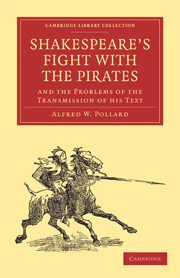THE REGULATION OF THE BOOK TRADE IN THE SIXTEENTH CENTURY
Published online by Cambridge University Press: 07 September 2010
Summary
LEGAL writers on English copyright have not shown much interest in the steps by which the conception of literary property was gradually built up, nor are any data easily accessible for comparing the course of its development in England and foreign countries. The accident by which our first English printer was also an exceptionally prolific literary producer and possessed of considerable influence at Court might well have led to a very early recognition of an author's rights to the fruits of his brain, had there been any competitor possessed of sufficient capital to be a really formidable pirate. In Germany, Italy, and France literary work of a kind for which copyright could now be claimed accounted for only quite a small proportion of the output of the earliest presses. The demand in Germany was mainly for printed editions of the ponderous text books of the previous three centuries. Italy added to these an even greater appetite for the Latin classics. In France, more especially at Lyons, there was a healthy demand for works, both imaginative and didactic, in the vernacular. But Caxton's fertility as a translator can hardly be paralleled in the fifteenth century, and this despite the fact that he came to the task late in life and burdened himself almost simultaneously with the cares of a printing house. A single book from his press, the Chronicles of England, which happens also to contain a long piece of original, or semi-original, writing probably from his pen, was reprinted by both Machlinia and (with additions) by the St Albans printer.
- Type
- Chapter
- Information
- Publisher: Cambridge University PressPrint publication year: 2010First published in: 1920

